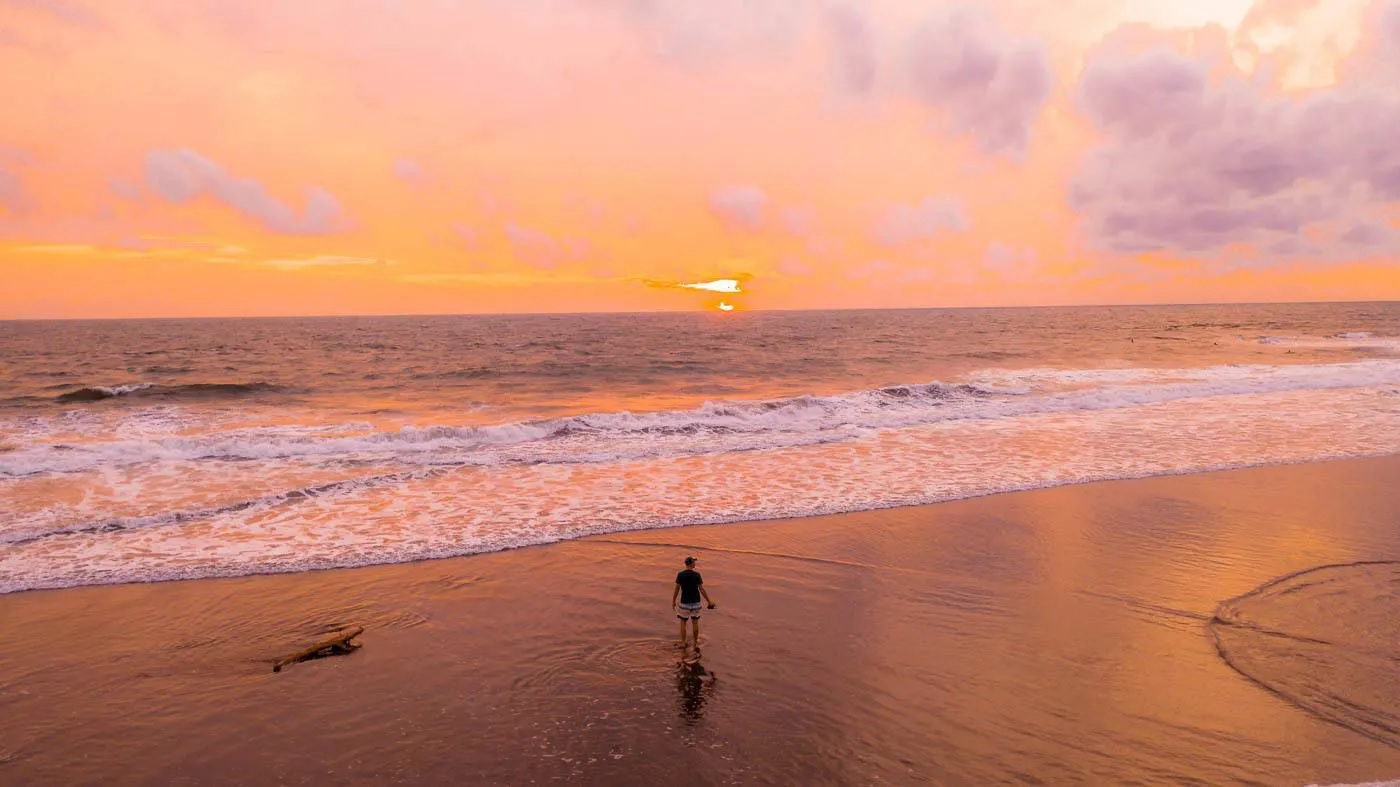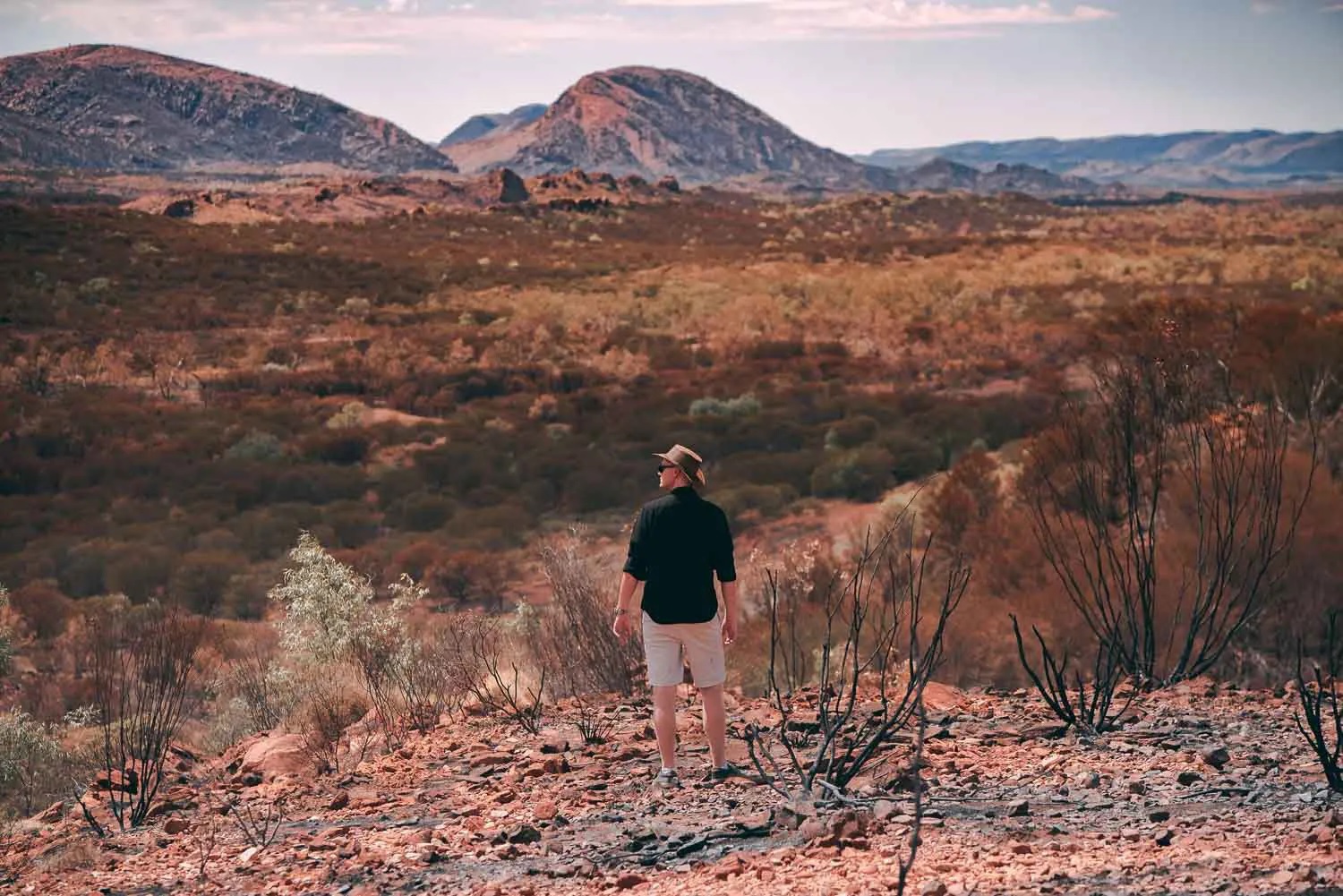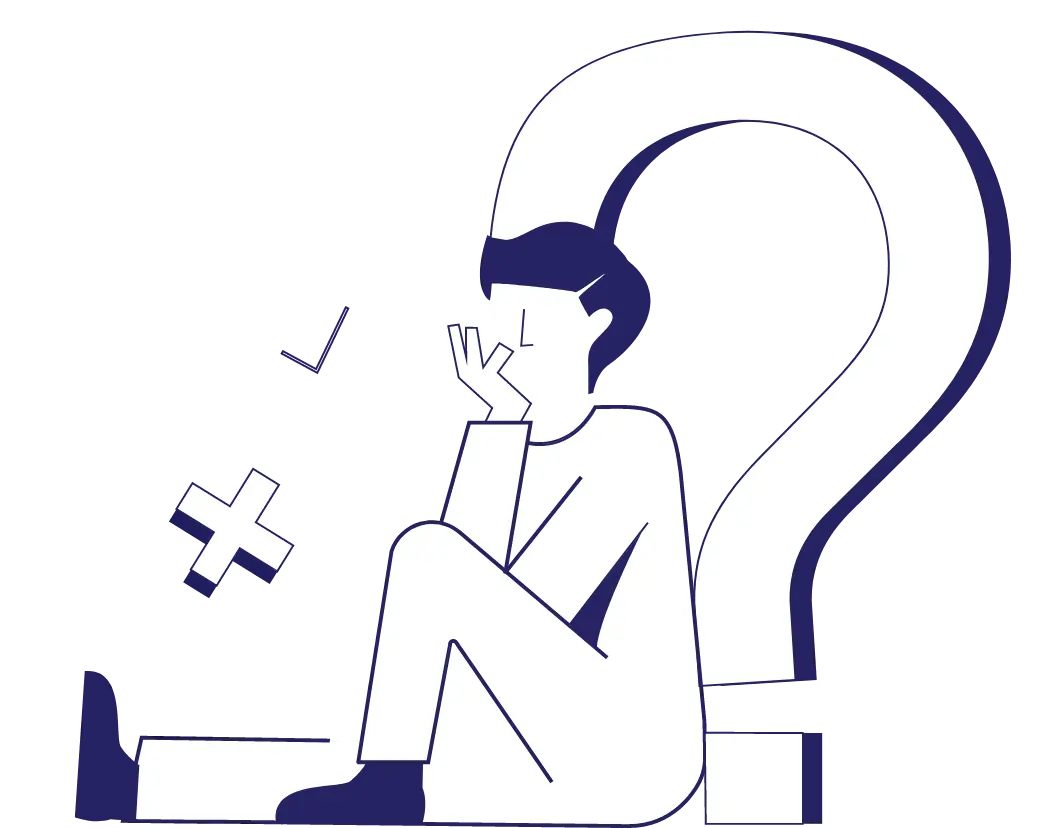

Began vs. Begun: What’s the Difference?
Home » Began vs. Begun: What’s the Difference?
When speaking or writing English, using the past tense can be confusing. There are many types of tenses when referring to events that have already happened. To make matters worse, English contains many irregular verbs that are conjugated in ways that don’t immediately make sense.
This lack of consistency can (and does) lead to quite a few mistakes. One of the easiest mistakes to make is to misuse began and begun, which are two forms of the irregular verb begin .
In spoken English, the two words are often used interchangeably, but in academic and professional writing, knowing the difference between these words is important.
Began vs Begun: What’s the Difference?
What is the difference between began and begun? In this article, I’ll explain the differences between began and begun, use these words in a sentence, and demonstrate how to choose began or begun and use each correctly.
When to Use Began

Began is the simple past tense form of begin. It does not need any helping, or auxiliary verbs , like had.
So, while you might say,
- Gavin began to open the package.
You would not say,
- Gavin had began to open the package.
Began is never used with a helping verb.
When to Use Begun

You could say,
- Yasmin had begun to eat the cake.
But you wouldn’t say,
- Yasmin begun to eat the cake.
If you’re using begun, it needs a helping verb in order to be correct.
This brings us to the differences between simple past and past participles. Simple past tense describes things that happened in the past. The sentence “Gavin began to open the package” describes an event that happened in the past. The past participle describes something that happened in the past in conjunction with other events in the past.
“Yasmin had begun to eat the cake” describes one of a sequence of events. For instance, one could say,
- Yasmin had already begun to eat the cake by the time we sang to her.
As you can see, began is not used with a helping verb.
Begun , on the other hand, is always used with a helping verb.
Trick to Remember the Difference

If you find yourself confused, remember that begun rhymes with one, and since begun is a past participle, it needs one more word to go with it: a helping verb.
Summary: Begun vs. Began
Began and begun are two forms of the irregular verb begin.
Began is the simple past conjugation. Began is not used with any helping verb.
Begun is the past participle form. Begun must always have a helping verb to be correct.
If you have trouble deciding which word to use, remember that begun rhymes with one and always needs one helping verb in grammatically correct English.
Being able to use each word accurately when speaking or writing signifies intelligence and professionalism. If you’re having trouble deciding whether to use began or begun, you can always revisit this article as a quick refresher.

35 Quotes To Inspire You On Your Journey Of Success
Journey is defined as a long and often difficult process of personal change and development; traveling from one place to another. The path to success might be tough, but once gain momentum, everything will fall to its place. Always remember to enjoy the journey because sometimes it’s more worthwhile the the destination itself. Don’t forget to thank all the people you helped you on your way. Everyone’s journey is different, so try not to compare yours to others. May these quotes inspire you on your journey to greatness .
1. “The journey of a thousand miles begins with one step.” Lao Tzu

2. “Don’t expect anyone to understand your journey , especially if they’ve never walked your path.”
3. “The beautiful journey of today can only begin when we learn to let go of yesterday.” Steve Maraboli
4. “It’s all about the journey not the outcome.” Carl Lewis
5. “The only impossible journey is the one you never begin.” Tony Robbins

6. “The true journey is one that is traveled with an inner GPS fully activated.” Alexis Brooks
7. “The journey is yours. Enjoy each and every step .” Anonymous
8. “Success is a journey, not a destination. The doing is often more important than the outcome.” Arthur Ashe
9. “Embrace the journey.” Anonymous
10. “Stay patient and trust your journey.” Anonymous

11. “The journey is long but the goal is in each step.” Sri Sri Ravi Shankar
12. “Life is a journey.” Anonymous
13. “The journey is the fun part.” Jaime Tardy
14. “Every day is a journey, and the journey itself is home.” Matsuo Basho
15. “Sometimes it’s the journey that teaches you a lot about your destination.” Drake

16. “Life is not a race but a journey to be savored each step of the way.” Anonymous
17. “This is your journey, your body, your mind, and your spirit. Dig deep, own it and start doing things for you and by you.” Anonymous
18. “Your journey has molded you for the greater good .” Asha Tyson
19. “Life is a journey filled with unexpected miracles.” Anonymous
20. “The end of a journey means the start of another.” Anonymous

21. “There is only one map to the journey of life and it lives within your heart .” Willie Nelson
22. “All journeys have secret destinations of which the traveler is unaware.” Martin Buber
23. “To travel is to take a journey into yourself.” Danny Kaye
24. “You must remain focused on your journey to greatness.” Les Brown
25. “Take the journey even if it means alone.” Anonymous

26. “Love is the spirit that motivates the artist’s journey.” Eric Maisel
27. “Our journey is about being more deeply involved in life and yet, less attached to it.” Ram Dass
28. “Sometimes the people around you won’t understand your journey. They don’t need to, it’s not for them.” Anonymous
29. “So the single most vital step on your journey towards enlightenment is this: learn to disidentify from your mind.” Eckhart Tolle
30. “Maybe the journey isn’t so much about becoming anything. Maybe it’s about unbecoming everything that isn’t really you, so you can be who you were meant to be in the first place.” Anonymous

31. “We must embrace pain and burn it as fuel for our journey.” Kenji Miyazawa
32. “The best journey always takes us home.” Anonymous
33. “The journey is much easier when you are not carrying your past.” Anonymous
34. “The journey to freedom is paved by the substance of our character.” Erwin McManus
35. “The only journey is the one within.” Rainer Maria Rilke

I hope these Journey Quotes inspired you to aim for success. Do let us know which one was your favorite in the comments section below.
Check Out This Video On Guided Meditation — A 10-Minute Journey To Inner Peace:
Have A Great Day!
35 Inspirational Quotes On Commitment
35 Inspirational Quotes On Joy
My name is Asad Meah, I am the CEO & Founder of AwakenTheGreatnessWithin. I am a dreamchaser who has gained a wealth of knowledge in entrepreneurship and personal development over the past five years through self-education. My mission is to inspire millions of people to become entrepreneurs by awakening their minds to their greatness that resides within them.

You may like

25 Jesus Quotes

35 Best March Quotes

35 Empath Quotes

35 Food Quotes

35 Fight Club Quotes On Success

35 Toxic People Quotes
Hilary Williams
March 12, 2019 at 2:05 pm
What an amazing quotes that transforms life. It gives one the courage to actually owns his own journey. I Love This.
March 28, 2019 at 6:14 pm
Glad you enjoyed the article Hilary
haddy Ndimballan
March 11, 2019 at 10:58 pm
Comment: The quotes are very inspirational, they give me more courage to push harder
March 28, 2019 at 6:15 pm
Glad you enjoyed the article Haddy
February 1, 2019 at 12:40 am
I I enjoy the wonderful quotes. It has been very inspectional.
February 22, 2019 at 11:40 am
Glad you enjoyed the quotes Rosaline
Your email address will not be published. Required fields are marked *

35 Coffee Quotes

35 Barbie Movie Quotes

35 Loyalty Quotes On Success

30+ Instagram Quotes
Money affirmation.

50 Inspirational Islamic Quotes On God, Life, Success, & The Hereafter

35 Inspirational God Quotes

35 Inspirational Prophet Muhammad (pbuh) ﷺ Quotes

35 Inspirational Quotes On Knowing Your Worth

35 Inspirational Quotes On Problems

20 Inspirational Quotes On Being A Good Person

25 Inspirational Quotes On Limits

60 Inspirational Quotes On Beauty

77 Beautiful Journey Quotes & Captions To Inspire An Inner Awakening
Searching for some words to accompany your own journey? I’ve compiled the best list out there of the most beautiful journey quotes to inspire and uplift you…
Maybe the most famous quote about journeys that millions across the globe know is from Lao Tzu. The ancient Chinese philosopher once said, “a journey of a thousand miles begins with a single step.” And since then, adventurers, journeyers and wanderers have passed on their own journey inspiration.
Whether your journey is a metaphorical or literal one, you will love my list of the best journey quotes that are guaranteed to lift you up and propel you forward.
These are the 77 best journey quotes.

The Best Journey Quotes
You may recognize a number of these quotes about journeys, as they come from the minds of some of the greatest individuals throughout history. These writers, leaders, musicians and adventurers understand the power of a life changing journey.
1) “If you can’t fly, then run, if you can’t walk run, then walk, if you can’t walk, then crawl, but by all means keep moving.” – Martin Luther King Jr.
2) “the road of life twists and turns and no two directions are ever the same. yet our lessons come from the journey, not the destination.” – don williams, jr., 3) “the best part of life is to decide to make the journey through life like a best selling book. tell a fantastic story when you are ready to tell others how you did it. make sure life the best story ever written through a journey filled with overcoming obstacles, taking risks, and continuing to develop.” – catherine pulsifer, 4) “we are travelers on a cosmic journey, stardust, swirling and dancing in the eddies and whirlpools of infinity. life is eternal. we have stopped for a moment to encounter each other, to meet, to love, to share. this is a precious moment. it is a little parenthesis in eternity.” – paulo coelho.

5) “If ever there was a metaphor to illustrate the importance of the journey over the destination, it is life itself. For everyone who departs from birth is destined for death, so the journey IS life. Savor it!” – Michele Jennae
6) “life is a journey, and if you fall in love with the journey, you will be in love forever.” – peter hagerty, 7) “the secret of getting ahead is getting started. the secret of getting started is breaking your complex, overwhelming tasks into small manageable tasks, and then starting on the first one.” – mark twain, 8) “it is good to have an end to journey toward; but it is the journey that matters, in the end.” – ernest hemingway.

9) “To finish the moment, to find the journey’s end in every step of the road, to live the greatest number of good hours, is wisdom.” – Ralph Waldo Emerson
10) “our battered suitcases were piled on the sidewalk again; we had longer ways to go. but no matter, the road is life.” ― jack kerouac, 11) “in order to complete our amazing life journey successfully, it is vital that we turn each and every dark tear into a pearl of wisdom, and find the blessing in every curse.” – anthon st. maarten, 12) “this thing we call life is not a destination with an end but a path down which we continue to journey as long as we can breath. life is to be lived not squandered or to give away waiting for the end to close upon us.” – byron pulsifer.

13) “Don’t judge each day by the harvest you reap, but by the seeds that you plant.” – Robert Louis Stevenson
14) “life should not be a journey to the grave with the intention of arriving safely in a pretty and well preserved body, but rather to skid in broadside in a cloud of smoke, thoroughly used up, totally worn out, and loudly proclaiming “wow what a ride”” – hunter s. thompson, 15) “sooner or later we must realize there is no station, no one place to arrive at once and for all. the true joy of life is the trip.” — robert j. hastings.

Short Journey Quotes
Quotes don’t have to be lengthy to capture the spirit of what they are trying to convey. These short journey quotes say so much with so little words.
16) “A journey of a thousand miles begins with a single step.” – Lao Tzu
17) “learn to trust the journey, even when you do not understand it.” – lolly daskal, 18) “a journey is time suspended.” – louis l’amour, 19) “take voyages. attempt them. there’s nothing else.” ― tennessee williams.

20) “I’m an idealist. I don’t know where I’m going, but I’m on my way.” — Carl Sandburg
21) “stop worrying about the potholes in the road and celebrate the journey.” – fitzhugh mullan, 22) “life’s a journey, not a race.” – unknown, 23) “life is a journey. when we stop, things don’t go right.” – pope francis.

24) “It is good to have an end to journey toward, but it is the journey that matters in the end.” ― Ursula K. Le Guin
25) “you must remain focused on your journey to greatness.” – les brown, 26) “i tramp a perpetual journey.” ― walt whitman, 27) “the real voyage of discovery consists not in seeking new landscapes, but in having new eyes.” – marcel proust.

28) “It’s not the years in your life that count. It’s the life in your years.” – Abraham Lincoln
29) “life is about waking up. it is a journey of discovery and you’ve already bought the ticket and are sitting on the train.” – michael sheridan,, 30) “the only impossible journey is the one you never begin.” – tony robbins, 31) “without music, life is a journey through a desert.” – pat conroy.

32) “What you learn in tough times can be used in many ways to bless your personal life journey.” – Scott Gordon
33) “accomplishments will prove to be a journey, not a destination.” – dwight d. eisenhower.

Inspiring Journey Quotes
Searching for the courage to take the first steps on your own journey? These inspiring journey quotes will light a fire under you, guaranteed to give you the courage you seek.
34) “I discovered that a fresh start is a process. A fresh start is a journey – a journey that requires a plan.” – Vivian Jokotade
35) “if you do what you’ve always done, you’ll get what you’ve always gotten.” – unknown, 36) “you don’t have to understand my journey. you just need to respect it.” – izey victoria odiase, 37) “when setting out on a journey do not seek advice from someone who never left home.” – rumi, 38) “to get through the hardest journey we need take only one step at a time, but we must keep on stepping.” – chinese proverb, 39) “you have learned a lot, but there are still lots of learning for you as you journey through life. never stop learning.” – kate summers, 40) “when you’re on a journey and you come to a wall, always throw your pack over first, because then you will be sure to follow.” – yongey mingyur rinpoche, 41) “ big things have small beginnings.” – prometheus.

42) “Life is a journey that have a lot different paths, but any path you choose use it as your destiny.” ― Ryan Leonard
43) “this is your journey, your body, your mind, and your spirit. dig deep, own it, and start doing things for you and by you.” – unknown author, 44) “as you journey down the path, don’t forget to be present moment-by-moment and absorb the beauty and richness of simply being alive.” – cary david richards, 45) “life is a journey of either fate or destiny. fate is the result of giving in to one’s wounds and heartaches. your destiny unfolds when you rise above the challenges of your life and use them as divine opportunities to move forward to unlock your higher potential.” – caroline myss.

46) “Temporary setbacks create opportunities for fresh commitment and renewal. There are seasons of sunshine as well as rain.” – T. D. Jakes,
47) “i believe that life is a journey, often difficult and sometimes incredibly cruel, but we are well equipped for it if only we tap into our talents and gifts and allow them to blossom.” – les brown, 48) “to find your confidence, get out of your comfort zone, overcome your fears, and begin the journey to discover and accomplish what you want to do with your life.” – doretha dingler.

Journey Instagram Quotes & Captions
Need a fantastic quote about journeys to accompany your own inspiring Instagram upload? These Instagram journey captions and quotes say so much in just the right amount of characters.
49) “Good company in a journey makes the way seem shorter.” – Izaak Walton
50) “always say yes to new adventures.”, 51) “it is better to travel well than to arrive.” – arthur c. custance, 52) “always take the scenic route.”.

53) “Travel is the only thing you buy that makes you richer.”
54) “don’t listen to what they say, go and see it for yourself.”, 55) “what’s on my bucket list everywhere.”, 56) “on a hard jungle journey, nothing is so important as having a team you can trust.” – tahir shah.

57) “Travel not to find yourself, but to remember where you have been all long.”
58) “don’t spend your money on things. spend it on experiences”, 59) “leap and the net will appear.” – zen proverb, 60) “all journeys have secret destinations of which the traveler is unaware.” ― martin buber, 61) “life is journey, travel it well.” – unknown.

Funny Journey Quotes
These funny quotes about journeys are short, punchy and shine a humorous light on some of the many obstacles a journey may come up against.
62) “Before you embark on a journey of revenge, dig two graves.” – Confucius
63) “me: “i want to travel more”, the bank account: “”like, to the park”, 64) “i have panicked unnecessarily in all four corners of the globe.” – jon ronson, 65) “good things come to those, who book flights.”.

66) “A journey is like marriage. The certain way to be wrong is to think you control it.” – John Steinbeck
67) “i crossed a time zone and i feel younger already. if i keep traveling west, i can become immortal” – jarod kintz, 68) “sometimes the road less traveled is less traveled for a reason.” – jerry seinfeld.

Celebrity Journey Quotes
Actors, entrepreneurs, musicians and more are the minds behind these poignant celebrity journey quotes that are sure to inspire and make you smile.
69) “The key to realizing a dream is to focus not on success but significance, and then even the small steps and little victories along your path will take on greater meaning.” – Oprah Winfrey
70) “sometimes it’s the journey that teaches you a lot about your destination.” – drake, 71) “you can handle just about anything that comes at you out on the road with a believable grin, common sense and whiskey.”– bill murray, 72) “you can’t connect the dots looking forward; you can only connect them looking backward. so you have to trust that the dots will somehow connect in your future. you have to trust in something; your gut, destiny, life, karma, whatever. this approach has never let me down, and it has made all the difference in my life.” – steve jobs.

73) “The main thing that you have to remember on this journey is, just be Nice to everyone and always smile.” – Ed Sheeran
74) “you take people, you put them on a journey, you give them peril, you find out who they really are.” – joss whedon, 75) “if all difficulties were known at the outset of a long journey, most of us would never start out at all.” – dan rather, 76. “every day is a new journey for me, and i feel like, in my lifetime, i’ve been blessed to experience such a lot.” – bindi irwin, 77) “not everyone will understand your journey. that’s okay. you’re here to live your life, not to make everyone understand.” – banksy.

Did I miss any great journey quotes?
Is there a journey quote I missed off my list that is one of your personal faves and that you want to share? Reach out to me with the quote, and I’ll see if I can add it to the my list of the best quotes about journeys!

Looking for inspiration for your next travel journey?
The quotes that made my list could really sum up so many journeys travelers take every day across the world. I’m a travel blogger who has traveled across the globe, and as a result my site has a huge variety of inspiring travel content. Accommodation guides, music festival guides, itineraries, city guides and so much more await you. Get started with some of my most popular travel content.
- 37 California Music Festivals That’ll Keep You Dancing All Year Long
- The ULTIMATE Bali Itinerary | How to Plan the Perfect Bali Vacation
- 30 Music Festivals in Europe to Experience Before You Die
- Thailand Itinerary 10 Days | How to Spend the Perfect 10 Days in Thailand
- 16 Amazing Japan “Off the Beaten Path” Destinations & Hidden Gems
- EDM FESTIVALS | The 20 Best Electronic Music Festivals in the USA
- The Ultimate 2 Days in Barcelona Itinerary & Travel Guide
- The Ultimate 2 Days in Kuala Lumpur Itinerary & Travel Guide
- The Ultimate 4 Days in Paris Itinerary & Travel Guide
- 51 Fun & Inspirational Sunset Quotes To Inspire Your Next Adventure

What’s your favorite journey quote?
Share this list with your journey travel crew, leave a reply, leave a reply cancel reply.
Your email address will not be published. Required fields are marked *
Save my name, email, and website in this browser for the next time I comment.
Photography Gear
Work With Me
Privacy Policy
Destinations
Music Festivals
Travel Itineraries
Inspiration
Travel Gifts
Southeast Asia
You are using an outdated browser. Please upgrade your browser or activate Google Chrome Frame to improve your experience.
Began or Begun: What’s the Difference? [With Examples and Tips]
Began and begun often get mixed up in English.
These two verb forms both come from the English infinitive to begin , but are used in different ways.
If you’re confused about the difference between the two, you definitely won’t be the only one. But not to worry! In this guide, I’ll explain how to know when to use began or begun , and give you plenty of examples to show how they are used in context.
So, are you ready to dive deeper into these two words? Let’s get started!
“Begin” vs. “Began” vs. “Begun”
When to use “began”, examples of “began”, when to use “begun”, examples of “begun”, an alternative to “began” or “begun”, expressions using “to begin”, 1. to begin (by) doing something, 2. to begin to see the light, 3. life begins at (age), and one more thing....
Download: This blog post is available as a convenient and portable PDF that you can take anywhere. Click here to get a copy. (Download)
Began and begun are often confused as they are forms of the verb begin , but they are actually used in different contexts and tenses.
Begin is considered an irregular verb because its past tense and past participle forms deviate from the standard rule of adding “-ed” to form past tenses. This means that instead of “begined,” the past tense is began , and the past participle is begun .
Began is the simple past tense form of begin , and is used to describe a completed action in the past. For example, “the concert began at 7 PM sharp.”
Begun is the past participle of begin. It’s used together with helping verbs such as has, have, or had to form various tenses, particularly the present perfect and past perfect. For example, “the race has begun,” and “I have begun my homework.”
As noted previously, began and begun are different forms of the verb to begin. Most commonly, it describes an action that is starting to happen, as in the following sentence:
He begins to read.
Let’s look at began first. Whenever we use began in English, we always have to remember to use it on its own.
Began is the simple past tense of to begin. This tense is used for an action (of any duration) that has finished in the past.
Here are some examples of the ways began can be used:
- It began to rain.
- She began to sing.
- I began to cry when I saw the disgusting lunch menu.
- You began to run because you were afraid of the dog.
As you can see in the last two examples, began can be used before a conjunction (like the word “when”) to introduce another clause (e.g. I saw the disgusting lunch menu ) .
Whether you’re starting your sentence with I, you, he, she, we or they, began stays the same. Phew!
You’ll also notice that began is always used by itself, unlike begun , which we’ll tackle in the next section.
Begun can never be on its own and always needs an auxiliary verb hanging around. If you can remember this difference, you’ll make the right choice about which word to use.
The most common auxiliary verb forms come from the English verb to have. (For example: had, has, have and will have.)
Unlike the simple past, begun is a past participle that’s used with the three perfect tenses: past perfect, present perfect and future perfect . They also describe a completed action but are more complex, suggesting how a previous action affects a current condition . For example:
I had begun to style my hair for the party when I realized there was a storm outside.
To construct these sentences, we need to start with the auxiliary verb, then add begun afterward.
Here are some more examples of the way begun can be used in a sentence:
- They had begun to play soccer before I got there.
- He has begun to smoke again.
- We have begun cooking the meal that we’re going to eat tonight.
- I will have begun my speech by the time you arrive.
Remember that, in speech and informal writing, the personal pronoun and the auxiliary verb usually contract and use an apostrophe (e.g. they’d begun).
The difference between began and begun can seem tricky at first, but it’s helpful to see them being used by native speakers in authentic contexts . You can do this easily by using a resource like FluentU .
FluentU takes authentic videos—like music videos, movie trailers, news and inspiring talks—and turns them into personalized language learning lessons.
You can try FluentU for free for 2 weeks. Check out the website or download the iOS app or Android app.
P.S. Click here to take advantage of our current sale! (Expires at the end of this month.)

Try FluentU for FREE!
Of course, there are alternatives to the verb to begin.
One that I’ve been using throughout this article is the verb to start . This verb is slightly more informal, and you can use it in most situations. For formal writing , though, to begin is often the better choice.
Here’s some great news: to start is a regular English verb, so its tenses are easier to manage!
Let’s look at to start in the simple past:
- I started my homework last night.
- They started laughing when they saw the clown.
- We started a new yoga class.
- You started learning Arabic.
Now, here is to start as a past participle with the perfect tenses (note that we have to use the auxiliary verb once again):
- She had started reading an old novel.
- It has started to snow.
- We have started a new project at work.
- He will have started his journey by now.
See how start becomes started in both cases? This makes it a super easy alternative to the verb to begin!
This verb is so common that a wide variety of expressions use it:
This means to start something by taking a specific action.
Let’s take an example using the infinitive form of to begin:
I begin by showing you how to use an English expression.
In the simple past (using began ), it looks like this:
I began by adding the eggs to the flour.
Using a perfect tense (auxiliary verb + begun ), it would be:
He had begun by stretching before going out for a run.
This is useful when you want to express that a situation is clear to you now but wasn’t in the past.
For example:
She begins to see the light about how horrible her boss is.
In the simple past (using began ):
You began to see the light when it came to your boyfriend.
And using a perfect tense (auxiliary verb + begun ):
He will have begun to see the light by the time he realizes we’ve stolen his credit card.
This is an expression you’ll hear in relation to the aging process. It means that, even though someone has reached a particular age (traditionally 40), they can still restart their life and take pleasure in it.
Life begins at 40.
Life began at 70 for Sarah.
And in a perfect tense (auxiliary verb + begun ):
Life has begun at age 50 for Mark.
I hope this article has given you a clearer sense of the troublesome twins began and begun so that you can check this grammar point off your list.
Proficiency comes with time, so remember to keep practicing your irregular verbs through writing, speaking, reading and listening!
If you like learning English through movies and online media, you should also check out FluentU. FluentU lets you learn English from popular talk shows, catchy music videos and funny commercials , as you can see here:

If you want to watch it, the FluentU app has probably got it.
The FluentU app and website makes it really easy to watch English videos. There are captions that are interactive. That means you can tap on any word to see an image, definition, and useful examples.

FluentU lets you learn engaging content with world famous celebrities.
For example, when you tap on the word "searching," you see this:

FluentU lets you tap to look up any word.
Learn all the vocabulary in any video with quizzes. Swipe left or right to see more examples for the word you’re learning.

FluentU helps you learn fast with useful questions and multiple examples. Learn more.
The best part? FluentU remembers the vocabulary that you’re learning. It gives you extra practice with difficult words—and reminds you when it’s time to review what you’ve learned. You have a truly personalized experience.
Start using the FluentU website on your computer or tablet or, better yet, download the FluentU app from the iTunes or Google Play store. Click here to take advantage of our current sale! (Expires at the end of this month.)
Enter your e-mail address to get your free PDF!
We hate SPAM and promise to keep your email address safe

Scale your content creation with Strategically AI | Talk to us

Began vs begun: The correct uses and clearing confusions
Verb tenses can be confusing because the same verb may have multiple variations for different tense forms. Irregular verb forms complicated the matter because their conjugating varieties often don't make immediate sense.
One such irregular verb is "begin". Many people struggle with congregating “begin” correctly in the past forms: began and begun. Comparing "began" vs "begun" will yield considerable differences, but people still misuse them often and make silly mistakes.
Regular verbs in the English language follow a simple rule for past tenses – they add the suffix '-ed' at the end of the word. For example, the past tense and past participle tense forms of the words "talk" and "dance" are "talked" and "danced," respectively. But irregular verbs like "begin," "drive," or "eat" don't follow this rule.
Began vs begun: The differences
When people speak, they often interchange "began" with "begun" and vice versa. But you cannot interchange them when writing in either academic or professional capacity.
Both "began" and "begun" are the tense forms of the verb "begin," meaning "to start" or "get going." The word is used in the simple present tense to describe an action happening at the moment.
So 'begin' is the main verb, and 'began' is its simple past form. On the other hand, 'begun' is the participle variation used in perfect tenses.
Some examples of "begin":
- How do you begin your day?
- The journey of a thousand miles begins with a single step.
- He begins a new project.
- Let's begin our practice.
- The football match will begin soon.
Let's see how it functions in the past and participle tenses.
When to use began
"Began" is the simple past tense form of the verb "begin," referring to a past action. It indicates that an activity or event started or happened at some point. You can use the word with both simple and progressive verbs, as in the following examples:
- Example 1: I began to study more diligently.
- Example 2: She began to feel better after taking some medication.
In most cases, using "began" is appropriate when describing an event with a definite beginning point in the past. While it refers to a finished activity, it may also indicate an ongoing action that was started in the past (Example 2).
Here are some more examples for your better understanding:
- I began my karate lessons two months ago.
- The football World Cup began in 1930.
- I can't remember when the storm began.
- Beth is a professional singer, but she began her career as an actor.
- He began working at 6 am.
Always remember that you cannot use "began" with an auxiliary verb. So, using it with have, has, is, are, or other helping verbs is incorrect.
- The project was began on time. (Incorrect)
- I have began my karate lessons two months ago. (Incorrect)
- The football World Cup had began in 1930. (Incorrect)
When to use begun
"Begun" is the participle form of the verb "begin," so it's only correct when you use it in perfect tenses.
To use the word correctly, you must use it in conjunction with another verb, or a helping verb, to be precise. For example, "I have begun to study for my test." In this sentence, "have begun" is the main verb, and "to study" is the infinitive. You cannot use the word "begun" by itself.
The word is applicable for past, present, and future tenses. Check these examples for a better understanding:
In the present perfect tense
We use the present perfect tense when we want to talk about an action that began in the past and continues into the present. The present perfect verb tense is formed with has or have + past participle.
For example, "I have begun my project'' means that I started it in the past and am still working on it.

In the past perfect tense
We use the past perfect tense when discussing an action that began and ended in the past. The formation of the past perfect verb tense includes had + past participle.
For example, "I had begun my project'' means that I started it before something else happened, and it was already completed by then.
In the future perfect tense
The future perfect tense indicates that an event or activity will start at a certain point.
For example, "I will have begun studying for my test tomorrow morning" means that I will start studying for my test tomorrow morning.
Common confusions about the usage of "began" and "begun"
"Began" and "begun" are two different forms of one verb and have separate functions and meanings in English grammar. However, non-native speakers can still confuse their usage in some specific contexts.
In a negative sentence
To determine the use of the correct word in a negative, you need to dissect the sentence structure. "Begun" is the right word for all present perfect and past perfect sentences. For instances:
- Present Perfect: The party has not begun yet.
- Past Perfect: The party had not begun yet.
A simple present or past sentence negation will include "did not" or "do/does not" and the base verb. So, the simple past form "began" won't be used in these cases. For instances:
- Present Perfect: The organiser does not begin the concert on time.
- Past Perfect: The organiser did not begin the concert on time.
In possessive words
Possessive words or contractions create another ground for confusion. Since a contraction is a shortened form of a word or words, it's easy to mix up the missing letters. Is it a verb, auxiliary, or modal? Look at the following examples:
- She's begun working out.
- It's just begun.
Some people may consider these examples wrong, thinking that the complete forms of "she's" and "it's" are "she is" and "it is." However, the apostrophe here represents the short form of "has," so the use of "begun" in the sentences is correct.
"Began" or "begun": How to remember?
The spellings of these words are pretty similar, except for an "a" and "u." However, their pronunciations are somewhat different:
Began: /bɪˈɡæn/ — sounds like bee·gan (American) and buh·gan (British)
—Some similar sounding words are undone, shun, and bun.
Begun: /bɪˈɡʌn/ — sounds like bee·guhn (American) and buh·guhn (British)
—Some similar sounding words are scan, fan, and clan.
When it comes to grammatical applications, remember that "begun" always needs a helping verb (a variation of "have" in most cases). Sometimes, you can pair it up with am, is, are, was, or were in passive sentences.
FAQs about began vs begun
Has officially "begun" or "began".
"Has officially begun" is the correct sentence here because it's a present participle tense, and "begun" is the right participle form of "begin." You can use "began" only in the simple past tense. For instance:
- The mayor has officially begun her campaign for reelection.
- The mayor began her campaign for reelection last month.
"Was begun": Is it correct?
From a grammatical sense, "was begun" is correct. The sentence uses the "verb + past participle" structure, so using "began" would be a mistake in this case. But using "begun" in the passive voice sounds a bit forced. Any English speaker will use the active form instead.
- The charity was begun as his dream project. (sounds forced)
- He began that charity as his dream project. (sounds natural)
How do you use the word "begun" in a sentence?
You can use "begun" in a sentence if it's in the participle form.
- Present Perfect: He has begun learning the language.
- Past Perfect: He had begun learning the language.
- Future Perfect: He will have begun learning the language before the new semester.
Scale your content creation with Strategically
Like this article spread the word, related articles.

Finity has a collection of latest 2,500 jobs to join next companies.
- For Talents
- For Companies
- Facebook Group
- Meet the Team
© Finity 2019, All Rights Reserved
Built with love by Grayic
- Link to facebook
- Link to linkedin
- Link to twitter
- Link to youtube
- Writing Tips
Word Choice: Began vs. Begun

2-minute read
- 25th November 2014
They are similar in spelling, but what exactly is the difference between the words ‘began’ and ‘begun’? Both stem from the verb ‘begin’, but they have specific uses. Read on to learn more about how they should be used.
The word ‘began’ is the simple past tense of ‘begin’, which means ‘start’. ‘Began’ is therefore used to describe things which happened in the past:
I began to run just as the bus pulled away.
However, ‘began’ is never used with auxiliary verbs (i.e. verbs, such as ‘has’ or ‘would have’, that add additional information to another verb in a sentence).
The word ‘begun’ is the past participle of ‘begin’. ‘Begun’ is used in the perfect tense sentences. It is, therefore, incorrect to write ‘I begun’, as ‘begun’ can never be used without an auxiliary verb (‘has’, ‘have’ or ‘had’). Thus, we must say that something ‘ has begun’ or ‘ had begun’.
The auxiliary verb used with ‘begun’ affects the tense of the sentence. When combined with ‘has’ or ‘have’, it is part of the present perfect tense. Typically, this shows that something started in the past and continues in the present:
I have begun writing my novel.
When combined with ‘has’, ‘begun’ is part of the past perfect tense. This is typically used when describing a completed action in relation to another event:
I had begun to write when my computer died.
Find this useful?
Subscribe to our newsletter and get writing tips from our editors straight to your inbox.
The auxiliary verb and past participle in sentences like these can sometimes be separated by a negative, such as ‘not’ or ‘cannot’, as in the following:
I have not begun to write my essay yet.
The Difference
The difference between ‘began’ and ‘begun’ is a matter of tense. Remember that the simple past tense (‘began’) does not require an auxiliary verb, while the past participle (‘begun’) always needs one.
I have beg a n attending art classes. – Incorrect
I have beg u n attending art classes. – Correct
I beg u n dancing when I was three years old. – Incorrect
I beg a n dancing when I was three years old. – Correct
If you would like to have your work checked for errors, why not try out Proofread My Essay ’s specialist academic proofreading service?
Share this article:
Post A New Comment
Get help from a language expert. Try our proofreading services for free.
How to cite the cdc in apa.
If you’re writing about health issues, you might need to reference the Centers for Disease...
5-minute read
Six Product Description Generator Tools for Your Product Copy
Introduction If you’re involved with ecommerce, you’re likely familiar with the often painstaking process of...
3-minute read
What Is a Content Editor?
Are you interested in learning more about the role of a content editor and the...
4-minute read
The Benefits of Using an Online Proofreading Service
Proofreading is important to ensure your writing is clear and concise for your readers. Whether...
6 Online AI Presentation Maker Tools
Creating presentations can be time-consuming and frustrating. Trying to construct a visually appealing and informative...
What Is Market Research?
No matter your industry, conducting market research helps you keep up to date with shifting...

Make sure your writing is the best it can be with our expert English proofreading and editing.

Short Essay: As One Journey Ends Another Begins
Three short essay examples on as one journey ends another begins.
Table of Contents
As One Journey Ends Another Begins Essay Example 1
Life is a journey, and every journey has a beginning and an end. Along the way, we encounter challenges, opportunities, and experiences that shape us into the people we are today. Sometimes, these journeys come to an end, and we find ourselves at a crossroads, unsure of what comes next. However, every ending is also a new beginning, and with every new journey, we have the opportunity to learn, grow, and evolve. In this essay, we will explore the end of one journey and the beginning of another, and how these experiences shape us as individuals.
The end of a significant journey can be a bittersweet experience. On one hand, there is a sense of accomplishment and pride in having completed the journey. On the other hand, there may be a sense of loss, as the journey was a significant part of our lives. Emotions associated with the end of a journey can range from sadness to relief, excitement to anxiety. Reflection on the lessons learned during the journey is also an essential part of the process. Every journey has its ups and downs, and it is during these challenging moments that we learn the most. Reflecting on the lessons learned during the journey can help us to grow and evolve as individuals. It can also help us to appreciate the journey for what it was and to recognize the value it brought to our lives.
Starting a new journey can be both exhilarating and daunting. The purpose of the new journey may be different from the previous one, and this can bring up a range of emotions. Excitement, anticipation, and curiosity are common emotions associated with starting a new journey. At the same time, there may be anxiety, fear, and uncertainty about the challenges that lie ahead. Reflection on the potential challenges and opportunities of the new journey is an essential part of the process. Every journey is unique, and there may be challenges that we have not encountered before. However, there may also be opportunities that we have not yet considered. Reflecting on the potential challenges and opportunities of the new journey can help us to prepare for what lies ahead.
Comparing and contrasting the two journeys is an essential part of the process of moving forward. There may be similarities and differences between the two journeys, and it is important to recognize these. Comparison of the lessons learned in the previous journey to those that may be learned in the new journey can help us to identify areas where we need to grow and evolve. Reflection on how the previous journey has prepared for the new journey is also an essential part of the process. Every journey prepares us for the next, and it is important to recognize the skills, knowledge, and experience that we have gained. Reflection can also help us to recognize areas where we may need to seek additional support or resources.
In conclusion, every journey comes to an end, and every ending is a new beginning. The emotions associated with the end of one journey and the beginning of another can be complex, but they are an essential part of the process of growth and evolution.
As One Journey Ends Another Begins Essay Example 2
Life is a journey that is full of ups and downs, twists and turns, and unexpected surprises. We all go through various journeys in our lives, and each one of them has its own unique experiences and lessons. Sometimes, these journeys come to an end, and we are left with a mix of emotions, ranging from accomplishment to sadness or relief. However, as one journey ends, another begins, and we are presented with new opportunities to grow and learn. In this essay, we will explore the end of a journey, the beginning of a new one, and the reflections on the transition between them.
The end of a journey can be a bittersweet experience. On the one hand, it is a time to celebrate the accomplishments and successes that were achieved during the journey. On the other hand, it can be a time of sadness or relief, especially if the journey was challenging or difficult. For instance, graduating from college can be a moment of pride for many students, but it can also be a time of uncertainty and apprehension about the future. Similarly, completing a project at work can be a time of relief, but it can also be a time of sadness if the project was enjoyable and fulfilling. However, regardless of the emotions felt, the end of a journey is always an opportunity to reflect on the lessons learned and the memories made during the journey.
The beginning of a new journey is often a time of excitement and anticipation. It is a chance to start fresh, to explore new opportunities, and to challenge oneself. However, it can also be a time of apprehension towards the unknown. Starting a new job, moving to a new city, or beginning a new relationship can all be overwhelming experiences. Nonetheless, it is important to set goals and aspirations for the new journey. For example, if starting a new job, one might set a goal to learn new skills or to make new connections. If moving to a new city, one might aspire to explore new places or to meet new people. Whatever the new journey may be, it is an opportunity to grow and learn.
Reflections on the transition between journeys can be insightful and thought-provoking. Comparing the old and new journeys can provide a better understanding of how the end of the old journey prepared for the new one. For example, the skills learned during college can be applied to a new job, or the experiences gained from traveling can be used to adapt to a new culture. Moreover, thoughts about the future and what it might bring can be both exciting and daunting. However, it is important to remember that each journey is unique and has its own set of challenges and opportunities.
In conclusion, life is a journey that is full of transitions, and as one journey ends, another begins. The end of a journey can be a time of mixed emotions, but it is always an opportunity to reflect on the lessons learned and the memories made. The beginning of a new journey can be exciting, but it can also be intimidating. Nonetheless, it is important to set goals and aspirations for the new journey.
As One Journey Ends Another Begins Essay Example 3
Life is a journey, and every journey has a beginning and an end. The end of one journey often marks the beginning of another, and this transition can be both exciting and daunting. In this essay, we will explore the emotions and thoughts that come with the end of a journey, the anticipation and challenges of starting a new journey, and the lessons learned and reflections that can guide us as we move forward.
The end of a journey can be a bittersweet experience. On one hand, it is a time to celebrate the accomplishments and milestones achieved throughout the journey. On the other hand, it can be a time of sadness and uncertainty as we say goodbye to the familiar and comfortable. Emotions such as joy, relief, and pride may accompany the end of a journey, but so too can feelings of disappointment, regret, and even grief. For example, graduating from college is an exciting accomplishment, but it also means leaving behind the people and places that have become a significant part of one’s life.
The beginning of a new journey is a time of anticipation and excitement. It is a chance to embark on a new adventure, to explore new possibilities, and to challenge oneself in new ways. However, the start of a new journey can also be filled with challenges and uncertainties. For example, starting a new job may bring excitement about the new opportunities, but also anxiety about the unknown expectations and demands. It is important to approach the new journey with an open mind and a willingness to learn and adapt.
Every journey has its own lessons to teach us, and the end of one journey can provide valuable insights into how we can approach the next one. Reflecting on the lessons learned and the personal growth achieved during the previous journey can help us to set goals and aspirations for the new journey. For example, if the previous journey taught us the importance of time management and prioritization, we can apply those lessons to the new journey to achieve greater success. Reflections on personal growth and development can also provide a sense of confidence and self-assurance as we embark on the new journey.
In conclusion, the end of a journey can be a time of both celebration and uncertainty, but it also marks the beginning of a new adventure. The anticipation and challenges of starting a new journey can be daunting, but the lessons learned and reflections from the previous journey can guide us towards greater success and personal growth. As we move forward, let us embrace the opportunities and challenges that come with each new journey, and let us continue to learn and grow along the way.
About Mr. Greg
Mr. Greg is an English teacher from Edinburgh, Scotland, currently based in Hong Kong. He has over 5 years teaching experience and recently completed his PGCE at the University of Essex Online. In 2013, he graduated from Edinburgh Napier University with a BEng(Hons) in Computing, with a focus on social media.
Mr. Greg’s English Cloud was created in 2020 during the pandemic, aiming to provide students and parents with resources to help facilitate their learning at home.
Whatsapp: +85259609792
[email protected]


Has Just Began or Has Just Begun: Past Tense vs. Past Participle
By: Author Susan Parker
Posted on Published: September 7, 2021
Choosing the correct phrase can be tricky, especially when words are very similar or expressed in different forms. The terms “began” and “begun” are two such words that can be challenging to master, especially when deciding whether you should say “has just begun” or “has just began.”
The correct phrase is “has just begun.” When using the helping verb “has,” a past participle must follow it to create the present perfect tense. This conveys that something has started but has not ended. “Began” is the simple past tense, which we use to describe an action that has started and finished. In contrast, we do not use “began” with a helping verb.
This article will explore past participles such as “begun” and past tense verb forms such as “began.” We’ll also consider the differences between “began” and “begun” and how to correctly use each word in a sentence.
Meaning of Begin
Before we get into a discussion of “began” or “begun,” we should consider the root word of both, which is “begin.”
“Begin” means to go into or start an action or process ( source ). Therefore, one must have a starting point to “begin.” “Begin” can also mean that something has arisen. Maybe a problem of some sort has come into existence. Consider the sentences below, which illustrate the word’s meaning.
- The class will begin at 1:00.
- The school year will begin on September 1st.
- Let the games begin!
- Dinner begins at 8 p.m. sharp.
- The issues begin when he doesn’t communicate with me.
Began vs. Begun
“Began” and “begun” are both past tenses that we form from the verb “begin.” Both words mean an action has commenced, but what’s the difference between the two?
“Began” is the simple past tense of “begin” and means something has started and finished.
“Begun” is the past participle form of “begin,” and we use it in the perfect tenses together with the helping verb “have.” If something “has begun,” it has already started but not has yet to finish.
Another example of past tense vs. past participle is eaten or ate. Click here for more information on this .
Simple Past Tense
The simple past tense is a way to describe something that happened in the past, before now. The word “began” is an example of a simple past tense verb. Consider the sentences below, which illustrate the use of “began” in describing a completed action.
- World War II began in 1939 and ended in 1945.
- Our test began at 11 a.m.
- The snow began to fall this morning; the roads are now white.
- Cars began to pile into the drive-in at 7 p.m.
The past tense of any verb will either be regular or irregular. For most verbs, you add either -d or -ed to present tense verbs. Below are a few simple past tense verbs:
- Push → Pushed
- Walk → Walked
- Grab → Grabbed
- Talk →Talked
Irregular past tense verbs do not follow any rules, so you must commit them to memory. “Began” is an example of such an irregular past tense verb. Here are a few more examples of common irregular past tense forms:
- Eat → Ate
- Fall → Fell
- Drink → Drank
- Forget → Forgot
- Drive → Drove
Past Participles
You will use the past participle in the perfect tenses to refer to completed actions. To create these tenses, we use a past participle together with a helping verb. We can also use them to form the passive voice, and they can sometimes function as adjectives ( source ).
“Begun” is an example of a past participle verb. In order to use a past participle correctly in a sentence, a helping verb must accompany it.
Here are some situations demonstrating how we could use “begun” in a sentence.
- She has begun writing her doctoral thesis.
- He has begun his medical training.
- Now that winter is upon us, the holidays have begun.
- The flowers have begun to bloom.
Regular past participles end with -ed, but there are many irregular ones too, such as “begun.”
Some common irregular past participles would include:
- Be → Been
- Choose → Chosen
- Come → Come
- Drink → Drunk
- Fall → Fallen
- Forget → Forgotten
Past participles do not function on their own but often pair with a helping verb such as “to have” or “to be.” As we previously mentioned, “begun” is an example of a past participle that pairs with “to have” — for instance, when trying to say something “has just begun.”
When Do We Say “Has Just Begun?”
You might also ask what the meaning of “has just begun” is. It simply means that something has recently started, and it hasn’t finished yet. A similar phrase would be “has already begun.” If we say, “it has already begun,” then we mean something that has started before now.
When we use the construction “has begun,” we are using the present perfect tense. English has three simple tenses (present, past, and future) and three perfect tenses (present perfect, past perfect, and future perfect). Let’s consider the verb “to begin” in each of these tenses.
As you can see, we use “begun” in all the perfect tenses together with various forms of the helping verb “to have.” Past participles can only stand on their own when they act as adjectives; as a verb, they need a helping verb.
Meaning of “Just” in “Has Just Begun”
The word “just” is an adverb that commonly expresses time. It can mean now, recently, or soon. When we use “just” in the phrase “has just begun,” we mean “has recently begun,” as in the sentences below.
- At nine months old, Jack has just begun to crawl.
- Sarah has just begun to understand a bit of French.
- Oh no, it has just begun to rain!
- Summer vacation is officially over; school has just begun .
In other contexts, the term “just” can also add emphasis to a statement or describe something that’s the same ( source ).
- You look just like your dad.
- I just can’t believe it.
- That’s just great; my car battery died on the highway.
All these examples using “has just begun” are in the present perfect tense. You will notice that using the helping verb “to have” means that we will use the present participle “begun” with it.
Doing so will help if you are wondering if it would be correct to say, “has officially began” or “has officially begun.” Similarly, what about “holidays have began” or “holidays have begun”?
In both these cases, we would use “begun” because both contain the helping verb “to have.” “Began” is a simple past tense verb and does not need a helping verb. We would therefore say:
- They will sing the national anthem to show the event has officially begun .
- I feel the holidays have begun when I smell roasting chestnuts.
Helping Verbs
Let’s explore the role of helping verbs a little further. Their role is to help the main verb in a sentence by extending its meaning and adding detail. Helping verbs are necessary to complete the structure of a sentence, and we can also use them to express time in a sentence ( source ).
There are two types of helping verbs: auxiliary and modal verbs.
Auxiliary Verbs
Auxiliary verbs accompany the main verb to show verb tense or add emphasis. One of the most common functions of the auxiliary verb is to establish the action in a sentence to a certain point in time.
The most common auxiliary verbs are “to have,” “to be,” and “to do,” but there are many others. Auxiliary verbs can stand alone, but they give more information about time or mood when they appear with the main verb. For example:
- I have begun to like him.
- He was winning the race before he tripped.
- She has eaten so many donuts!
In these examples, the auxiliary verbs go together with the main verb to create “have begun,” “was winning,” and “has eaten.” They all provide further information about time.
Modal Verbs
Helping verbs that further modify the action or meaning of the main verb in a sentence to show obligation, possibility, or necessity are modal verbs. These verbs do not change form and include the following:
- Can: I can ride my bike with no hands.
- Could: I could come to see you today.
- Might: I might see the doctor today.
- Will: I will fly home early from my trip.
- Should: You should see a doctor if you feel ill.
- Must: I must see you right away.
- May: May I buy you a coffee this morning?
- Shall: I shall ride my bike to work today.
- Would: I would love to see you tomorrow.
Using “Begin” in Other Tenses
A verb tense indicates when the action takes place. Most verbs have a past, present, or future tense, meaning verbs can change form. You can change the form by simply adding a different ending or changing the spelling ( source ).
We know that the past tense describes something that has already happened. What about the present and future tense?
Present Tense
Simple present tense verbs are action words that express what is happening currently or something that occurs regularly in the present time. Here are some examples of “begin,” where it operates in the present tense.
- The sky begins to darken as night falls.
- My patience begins to run thin as my kids continue not to listen.
- You might begin to wonder what is going on.
- The teacher begins her lesson today.
Future Tense
Simple future tense verbs describe things that are yet to happen, that will begin and end in the future ( source ). Here are some examples of “begin” in the future tense.
- The online class will begin on Tuesday.
- He will begin violin lessons next month.
- You will begin to understand if you do your homework.
“Begin” in Different Participle Forms
As there are different verb forms of “begin,” there are also different participle forms.
Present Participle
A present participle is a verb ending with -ing that forms continuous tenses or functions as an adjective. Present participles typically convey current action. The verb “begin” becomes “beginning” when using the present participle form. Consider the examples below.
- The beginning of the school year is fast approaching.
- She is beginning her college applications as the deadline fast approaches.
In the first sentence, the participle functions as an adjective to describe the time in the school year. Sentence number two describes an ongoing action — she is in the process of starting her applications. This article was written for strategiesforparents.com.
Perfect Participle
Another less common form of the participle is the present participle, which we form by combining the word “having” with the past participle. Perfect participles determine that an action was completed before the action in the sentence’s main clause ( source ), as in the examples below.
- Having begun the test early, she sat quietly, waiting for her classmates to finish.
- She graduated early, having already begun her postgraduate studies.
Final Thoughts
It’s essential to know the difference between past tenses and past participles so that we can use them correctly in both spoken and written English. Mastering when to use “begun” vs. “began” will help to clarify this further.
“Begun,” as a past participle, requires assistance from a helping verb. “Began,” as a simple past tense, stands alone to describe something that started in the past.
With some practice, you’ll be able to effortlessly use both “began” and “begun” in fluent English, and you will know that the correct phrase to choose is “has just begun” because the helping verb always accompanies the past participle.
- Link to facebook
- Link to linkedin
- Link to twitter
- Link to youtube
- Writing Tips
Word Choice: Began vs. Begun

3-minute read
- 5th June 2016
Does the English language really need both “began” and “begun”? Wouldn’t it be simpler to just have one past tense version of “begin”? Of course it would, but nobody said English grammar would be easy (in fact, many have said the opposite ).
So what exactly is the difference between “began” and “begun”? And why should you try to avoid confusing them in your work ?
Began (Simple Past Tense)
The verb “begin” means “start.” But whether to use “began” or “begun” for something that has already started depends on how you phrase the sentence.
“Began” is the simple past tense of “begin” and used when describing an action or process that started in the past, but that has now finished:
The Second Boer War began in 1899 and ended in 1902 .
You can also use “began” for an ongoing action or event:
The day began well and has gotten better since!
But it’s worth remembering that “began” is most often used for past events that have come to an end, since “begun” has a slightly different use.
Begun (Past Participle)
“Begun” is a past participle, used in the perfect tenses . These tenses help us refer to completed actions, combining a past particple with some form of “have,” “has,” or “had” as a helper verb. For example, the present perfect tense allows us to talk about something which began in the past but continues into the present:
Present Perfect Tense: I have begun writing my book.
The past perfect allows us to refer to something that began in relation to another past action or a specified point in the past. For instance:
Past Perfect Tense: I had begun writing my book by the time you met me.
Find this useful?
Subscribe to our newsletter and get writing tips from our editors straight to your inbox.
And the future perfect lets us refer to something that will have started by a certain point in the future. For example:
Future Perfect Tense: I will have begun writing my book by then.
The key point to remember, then, is that if this word is preceded by some variation of “have,” the correct term to use will be “begun.
Summary: Began or Begun?
There are two things to consider when using “began” or “begun.”
The first is whether your sentence contains a helper verb (usually a variation of “have”), since this will usually mean you need “begun.”
The second is whether what you are describing has already ended. If so, you will usually need to use “began.” Remember:
Began = Simple past tense
Begun = Past participle
And if you’d like an expert eye to check your spelling and grammar, we have editors who can help. Try our free trial service today to find out more.
Share this article:
Post A New Comment
Got content that needs a quick turnaround? Let us polish your work. Explore our editorial business services.
2-minute read
How to Cite the CDC in APA
If you’re writing about health issues, you might need to reference the Centers for Disease...
5-minute read
Six Product Description Generator Tools for Your Product Copy
Introduction If you’re involved with ecommerce, you’re likely familiar with the often painstaking process of...
What Is a Content Editor?
Are you interested in learning more about the role of a content editor and the...
4-minute read
The Benefits of Using an Online Proofreading Service
Proofreading is important to ensure your writing is clear and concise for your readers. Whether...
6 Online AI Presentation Maker Tools
Creating presentations can be time-consuming and frustrating. Trying to construct a visually appealing and informative...
What Is Market Research?
No matter your industry, conducting market research helps you keep up to date with shifting...

Make sure your writing is the best it can be with our expert English proofreading and editing.
Synonyms of begun
- as in commenced
- as in started
- as in founded
- More from M-W
- To save this word, you'll need to log in. Log In
Thesaurus Definition of begun
Synonyms & Similar Words
- embarked (on or upon)
- fallen (to)
- entered (into or upon)
- struck (into)
- stricken (into)
- inaugurated
- established
- got down (to)
- got around (to)
- gotten around (to)
- gotten down (to)
- gotten round (to)
- got round (to)
Antonyms & Near Antonyms
- discontinued
- knocked off
- extinguished
- exterminated
- materialized
- shaped (up)
- disappeared
- passed away
- constituted
- constructed
- manufactured
- thought (up)
- cooked (up)
- systematized
- reinitiated
- reinstituted
- closed (down)
- annihilated
- rounded (off or out)
Thesaurus Entries Near begun
Cite this entry.
“Begun.” Merriam-Webster.com Thesaurus , Merriam-Webster, https://www.merriam-webster.com/thesaurus/begun. Accessed 21 Apr. 2024.
More from Merriam-Webster on begun
Nglish: Translation of begun for Spanish Speakers
Britannica English: Translation of begun for Arabic Speakers
Subscribe to America's largest dictionary and get thousands more definitions and advanced search—ad free!

Can you solve 4 words at once?
Word of the day, noblesse oblige.
See Definitions and Examples »
Get Word of the Day daily email!
Popular in Grammar & Usage
Your vs. you're: how to use them correctly, every letter is silent, sometimes: a-z list of examples, more commonly mispronounced words, how to use em dashes (—), en dashes (–) , and hyphens (-), absent letters that are heard anyway, popular in wordplay, the words of the week - apr. 19, 10 words from taylor swift songs (merriam's version), a great big list of bread words, 10 scrabble words without any vowels, 12 more bird names that sound like insults (and sometimes are), games & quizzes.

Comment by DrCheis
Comment by diceys, comment by 249960, comment by 233434, comment by armyspc19695, comment by hjp426, comment by eighjan, comment by eommus, comment by gunstrong907, comment by l2pwncomputers, comment by lilyoptra, comment by onefreakycoppa, comment by indigloraver, comment by joenus76, comment by avalith, the journey has just begun.
- Your comment must be in English or it will be removed.
- Unsure how to post? Check out our handy guide !
- You might want to proof-read your comments before posting them.
- Please post questions on our forums for quicker reply.
- Screenshots containing UI elements are generally declined on sight, the same goes for screenshots from the modelviewer or character selection screen.
- The higher the quality the better!
- Please review our Screenshot Guidelines before submitting!
The Wowhead Client is a little application we use to keep our database up to date, and to provide you with some nifty extra functionality on the website!
It serves 2 main purposes:
- It maintains a WoW addon called the Wowhead Looter , which collects data as you play the game!
- It uploads the collected data to Wowhead in order to keep the database up-to-date!
You can also use it to keep track of your completed quests, recipes, mounts, companion pets, and titles!
So, what are you waiting for? Download the client and get started.

IMAGES
VIDEO
COMMENTS
10 quotes for a fresh beginning. If you're starting over somewhere new, these quotes can help you feel more confident in your new beginnings. 1. "A journey of a thousand miles begins with a single step." - Lao Tzu. 2. "The best way to predict the future is to create it.". - Abraham Lincoln. 3.
Summary: Begun vs. Began. Began and begun are two forms of the irregular verb begin. Began is the simple past conjugation. Began is not used with any helping verb. Begun is the past participle form. Begun must always have a helping verb to be correct. If you have trouble deciding which word to use, remember that begun rhymes with one and always ...
1. "It is never too late to be what you might have been." -- George Eliot. 2. "And suddenly you just know it's time to start something new and trust the magic of beginnings." -- Meister Eckhart. 3 ...
Another common mistake is when "has/have begun" is used when the simple past tense "began" would be more appropriate. Incorrect: She has begun her journey yesterday. Correct: She began her journey yesterday. Forming passive constructions incorrectly.
17. "This is your journey, your body, your mind, and your spirit.Dig deep, own it and start doing things for you and by you." Anonymous. 18. "Your journey has molded you for the greater good."Asha Tyson. 19. "Life is a journey filled with unexpected miracles."Anonymous. 20. "The end of a journey means the start of another."Anonymous. 21.
26) "I tramp a perpetual journey."―. Walt Whitman. 27) "The real voyage of discovery consists not in seeking new landscapes, but in having new eyes.". - Marcel Proust. 28) "It's not the years in your life that count. It's the life in your years.". - Abraham Lincoln. 29) "Life is about waking up.
1. The Guardian - Music. The journey had begun on September 1 with a 4-1 win over Oadby Town before 329 people and ended in front of 2,420 against a club six tiers higher. 2. The Guardian - Sport. The journey had begun as it does for the 3,000 men who work there each day - those who do not sleep at the plant itself. 3.
About Press Copyright Contact us Creators Advertise Developers Terms Privacy Policy & Safety How YouTube works Test new features NFL Sunday Ticket Press Copyright ...
In grammar, 'begin' is used as a transitive and intransitive verb, while 'began' and 'begun' are used as past tense forms of 'begin'. Here are some examples of how to use 'begin' in grammar points: Transitive verb: She began the meeting by introducing the agenda. Intransitive verb: The concert will begin at 8 pm.
Began is the simple past tense form of begin, and is used to describe a completed action in the past. For example, "the concert began at 7 PM sharp.". Begun is the past participle of begin. It's used together with helping verbs such as has, have, or had to form various tenses, particularly the present perfect and past perfect.
The journey of a thousand miles begins with a single step. ... To use the word correctly, you must use it in conjunction with another verb, or a helping verb, to be precise. For example, "I have begun to study for my test." In this sentence, "have begun" is the main verb, and "to study" is the infinitive. ... Present Perfect: He has begun ...
The word 'begun' is the past participle of 'begin'. 'Begun' is used in the perfect tense sentences. It is, therefore, incorrect to write 'I begun', as 'begun' can never be used without an auxiliary verb ('has', 'have' or 'had'). Thus, we must say that something ' has begun' or ' had begun'. The auxiliary ...
The beginning of a new journey can be exciting, but it can also be intimidating. Nonetheless, it is important to set goals and aspirations for the new journey. As One Journey Ends Another Begins Essay Example 3. Life is a journey, and every journey has a beginning and an end. The end of one journey often marks the beginning of another, and this ...
Another way to say Has Begun? Synonyms for Has Begun (other words and phrases for Has Begun). Synonyms for Has begun. 107 other terms for has begun- words and phrases with similar meaning. Lists. synonyms. antonyms. definitions. sentences. thesaurus. suggest new. already started. had already begun.
Luffy is the captain of his pirate crew "Mugiwara", which is destined to find "One Piece" — an unimaginably large fortune hidden by the former "Pirate King", Roger. The fortune ...
The correct phrase is "has just begun.". When using the helping verb "has," a past participle must follow it to create the present perfect tense. This conveys that something has started but has not ended. "Began" is the simple past tense, which we use to describe an action that has started and finished. In contrast, we do not use ...
Has Just Begun synonyms - 52 Words and Phrases for Has Just Begun. barely started. has barely begun. has just started. has only begun. has only just begun. have just begun. just getting started. just got started.
There are two things to consider when using "began" or "begun.". The first is whether your sentence contains a helper verb (usually a variation of "have"), since this will usually mean you need "begun.". The second is whether what you are describing has already ended. If so, you will usually need to use "began.".
408 likes, 13 comments - rubinsartMarch 29, 2024 on : " Another journey has begun. Colin's journey and I'm nervous to post this LOL I initially didn't plan to make those panels into...". Art is Arting | 🫡 Another journey has begun.
Synonyms for BEGUN: commenced, started, launched, embarked (on or upon), fallen (to), set about, entered (into or upon), got going; Antonyms of BEGUN: ended, finished ...
Begin A Journey synonyms - 44 Words and Phrases for Begin A Journey. 23 skiddoo. 23 skidoo. twenty three skiddoo. twenty three skidoo. twenty-three skiddoo. twenty-three skidoo. be the start of a road. hit the road.
The new ducks are here, had to run out and get them at 5 AM because a shipping delay caused them to be a day longer in transit than expected. We only lost o...
The Journey Has Just Begun Completion A dragon slayer and a seasoned leatherworker? You do not cease to astonish, hero. I am humbled. Please accept what I am about to teach you. This knowledge will prove to be invaluable if you are to destroy what remains of the Black Dragonflight. Create the cloak from the scales of the brood mother.
Another journey has begun 🙏🏻 Feeling so thankful and blessed ️🙏🏻 ️👑🥰☺️🌠🌠🌠🌠🌠🌠🌠🌠. Thanks @sculpcenter @dan_on_a_mission @fabianbolin @samisamuraij and all the brothers in L1, L2 and L3. I can't describe my gratitude towards you 🙏🏻 ️ @dharenso @vibebyfelix @arvidmalmer @jocke_falk
The journey to the Stanley Cup Final has begun. And nothing sets the tone for a playoff series like Game 1. Our B/R NHL Staff will have reactions to every…